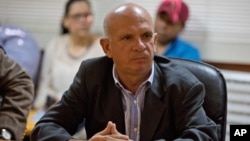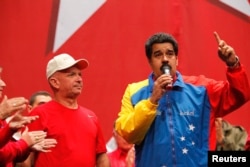Spanish police on Friday arrested Hugo Carvajal, a former general and close ally of the late Venezuelan leader Hugo Chavez, on drug trafficking charges on an arrest warrant issued by the United States, a police spokeswoman said.
The spokeswoman would not provide further details about the charges against Carvajal. In 2008, the U.S. Treasury sanctioned Carvajal for "materially assisting the narcotics trafficking activities" of Colombia's FARC rebel group.
A court spokesman said Carvajal would appear before Spain's High Court on Saturday. The court needs to decide within 24 hours of his arrest whether he will be jailed pending a decision on his extradition or if he will be set free.
The U.S. Justice Department did not immediately respond to a request for comment.
Carvajal, head of military intelligence from 2004 to 2008,denounced Chavez' successor Nicolas Maduro in February and gave his support to Juan Guaido, who in January invoked the constitution to become Venezuela's interim president. Guaido was later recognized by the United States and dozens of governments, but Maduro remains in office with support of the military and has denounced Guaido as a U.S. puppet.
The U.S. Treasury's Office of Foreign Assets Control (OFAC), in its 2008 statement, said Carvajal's assistance to the Revolutionary Armed Forces of Colombia included protecting drug shipments from seizure by Venezuelan anti-narcotics authorities and providing them with weapons.
Carvajal also provided FARC with official Venezuelan government identification documents that allowed its members to travel to and from Venezuela, OFAC said.
In 2014, Carvajal was arrested on the Dutch Caribbean island of Aruba on a U.S. drug trafficking warrant, but the Dutch government accepted Venezuela's argument that he had diplomatic immunity because he had been nominated consul to Aruba.
In an interview with the New York Times published in February, Carvajal said any dealings he had with drug traffickers resulted from his role investigating them as intelligence chief.
Carvajal said he had met with FARC members in 2001 to engage them as a government negotiator in the kidnapping of a Venezuelan businessman, a trip that had been approved by presidents in both Venezuela and Colombia.






